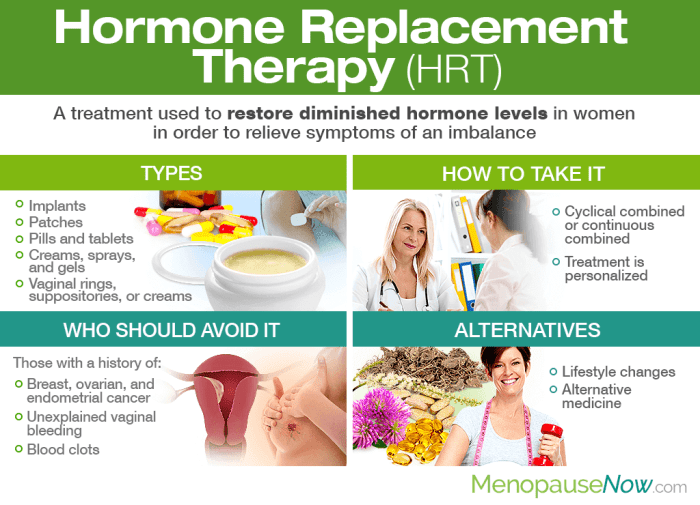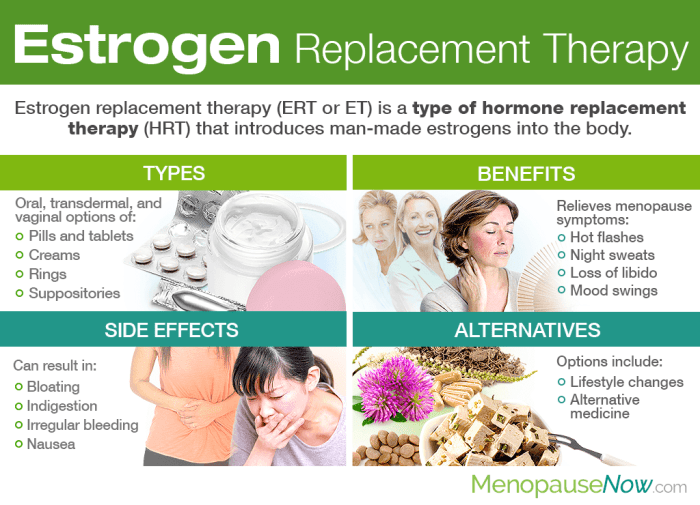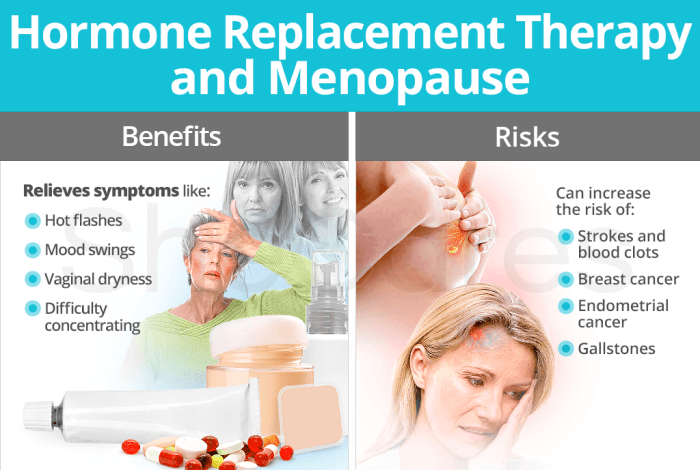Hormone therapy for menopause – As women approach menopause, hormone therapy emerges as a potential solution to alleviate its uncomfortable symptoms. This therapy involves the administration of hormones to mimic the body’s natural hormonal balance, offering relief from hot flashes, night sweats, and other menopause-related challenges.
However, the decision to undergo hormone therapy is not without its complexities. Understanding the types, benefits, risks, and alternatives available is crucial for making an informed choice. This article delves into the intricacies of hormone therapy for menopause, providing a comprehensive guide to help women navigate this important healthcare decision.
Introduction
Hormone therapy is a treatment option for women experiencing the symptoms of menopause, which is the natural decline in estrogen production that occurs as women age.
Menopause is a common experience, affecting up to 90% of women. The average age of menopause is 51, but it can occur earlier or later.
Prevalence of Menopause and Hormone Therapy Usage
In the United States, an estimated 30 million women are currently experiencing menopause.
About 40% of women who experience menopause use hormone therapy to manage their symptoms.
Types of Hormone Therapy
Hormone therapy for menopause can be administered in various forms, each with its own advantages and disadvantages. The three main types of hormone therapy are estrogen-only therapy, progestin-only therapy, and estrogen-progestin combination therapy.
Estrogen-only Therapy
- Advantages:Relieves hot flashes and night sweats, improves vaginal dryness, and protects against osteoporosis.
- Disadvantages:Can increase the risk of endometrial cancer, especially in women who have not had a hysterectomy.
Progestin-only Therapy
- Advantages:Used in women who have had a hysterectomy to prevent endometrial cancer, may help reduce hot flashes.
- Disadvantages:Can cause irregular bleeding, does not protect against osteoporosis.
Estrogen-Progestin Combination Therapy
- Advantages:Relieves hot flashes and night sweats, improves vaginal dryness, protects against osteoporosis, and reduces the risk of endometrial cancer.
- Disadvantages:May increase the risk of breast cancer, blood clots, and stroke.
Benefits of Hormone Therapy
Hormone therapy offers numerous benefits in alleviating the symptoms of menopause. These benefits include:
Reducing Hot Flashes and Night Sweats
Hormone therapy effectively reduces the frequency and severity of hot flashes and night sweats. Estrogen, one of the hormones used in hormone therapy, helps regulate body temperature, reducing the sudden and uncomfortable changes that occur during these episodes.
Improving Sleep Quality
Hormone therapy can significantly improve sleep quality in menopausal women. By reducing hot flashes and night sweats, hormone therapy allows for more restful and uninterrupted sleep. Additionally, hormone therapy has been shown to alleviate anxiety and depression, which can further contribute to improved sleep.
Preventing Bone Loss
Estrogen plays a crucial role in maintaining bone density. As estrogen levels decline during menopause, women are at an increased risk of developing osteoporosis, a condition that weakens bones and makes them more susceptible to fractures. Hormone therapy, by replenishing estrogen levels, helps prevent bone loss and reduces the risk of osteoporosis.
Risks and Side Effects of Hormone Therapy
Hormone therapy can provide relief from menopausal symptoms, but it’s essential to be aware of the potential risks and side effects associated with its use. These include:
Increased Risk of Breast Cancer
Studies have shown that women who take hormone therapy, particularly those containing estrogen, have a slightly increased risk of developing breast cancer. The risk is generally small, but it’s something to consider when making a decision about hormone therapy.
Blood Clots
Hormone therapy can increase the risk of blood clots in the legs or lungs. This risk is higher in women who are overweight, smoke, or have a history of blood clots.
Stroke
Hormone therapy can also increase the risk of stroke, especially in women over 65 or those with a history of heart disease.
It’s important to discuss these risks with your healthcare professional before starting hormone therapy. They can help you weigh the benefits and risks and make the best decision for your individual situation.
Who is a Good Candidate for Hormone Therapy?

Hormone therapy (HT) is a treatment option for women experiencing menopause symptoms. However, it is not suitable for everyone. Several factors determine whether someone is a good candidate for HT, including age, menopause symptoms, and overall health.
Age, Hormone therapy for menopause
HT is generally most effective when started within the first 10 years after menopause. The benefits of HT tend to diminish with increasing age.
Menopause Symptoms
HT is primarily used to treat moderate to severe menopause symptoms, such as hot flashes, night sweats, and vaginal dryness. Women who experience these symptoms may be good candidates for HT.
Overall Health
HT is not recommended for women with certain health conditions, such as:
- Current or history of breast cancer
- Current or history of blood clots
- Liver disease
- Uncontrolled high blood pressure
The decision of whether or not to start HT is a personal one that should be made in consultation with a healthcare professional.
Alternatives to Hormone Therapy

While hormone therapy remains a common approach to managing menopause symptoms, there are several alternative treatments that can also provide relief. These alternatives may include lifestyle changes, medications, and herbal remedies.
It’s important to consult with a healthcare professional to determine the most appropriate treatment option based on individual needs and preferences.
Lifestyle Changes
Making certain lifestyle changes can help alleviate some menopause symptoms, such as:
- Regular exercise:Exercise can help improve mood, reduce stress, and strengthen bones.
- Healthy diet:Eating a balanced diet rich in fruits, vegetables, and whole grains can provide essential nutrients and help maintain a healthy weight.
- Adequate sleep:Getting enough sleep can help reduce fatigue and improve overall well-being.
- Stress management:Engaging in stress-reducing activities, such as yoga, meditation, or spending time in nature, can help improve mood and reduce anxiety.
Medications
Certain medications can be used to treat specific menopause symptoms, such as:
- Antidepressants:Selective serotonin reuptake inhibitors (SSRIs) and serotonin-norepinephrine reuptake inhibitors (SNRIs) can help improve mood and reduce hot flashes.
- Gabapentin:This medication can help reduce hot flashes and night sweats.
- Clonidine:This medication can help reduce hot flashes and anxiety.
Herbal Remedies
Some herbal remedies have been shown to have potential benefits for managing menopause symptoms, such as:
- Black cohosh:This herb has been traditionally used to reduce hot flashes and night sweats.
- Red clover:This herb contains isoflavones, which have estrogen-like effects that may help alleviate menopause symptoms.
- Soy:Soy products contain isoflavones, which may help reduce hot flashes and improve bone health.
Note:It’s important to use herbal remedies under the guidance of a healthcare professional, as some may interact with medications or have potential side effects.
| Alternative | Effectiveness | Safety |
|---|---|---|
| Lifestyle changes | Moderate | High |
| Medications | High | Moderate (potential side effects) |
| Herbal remedies | Low to moderate | Generally low (but some may have potential side effects) |
Conclusion
In summary, hormone therapy for menopause can be an effective treatment for managing symptoms such as hot flashes, night sweats, and vaginal dryness. However, it’s important to consult with a healthcare professional to discuss the potential benefits and risks and determine if hormone therapy is right for you.
If you’re considering hormone therapy, be sure to talk to your doctor about your medical history, current health status, and lifestyle. They can help you make an informed decision and develop a treatment plan that meets your individual needs.
Resources
Here are some resources for further information and support on hormone therapy for menopause:
- The North American Menopause Society: https://www.menopause.org/
- The National Institute on Aging: https://www.nia.nih.gov/health/menopause
- The American College of Obstetricians and Gynecologists: https://www.acog.org/womens-health/faqs/menopause
Epilogue

In conclusion, hormone therapy for menopause presents both potential benefits and risks. The decision to pursue this treatment should be made in consultation with a healthcare professional, considering individual circumstances and preferences. Alternative therapies offer varying degrees of effectiveness and safety, providing options for women who may not be suitable candidates for hormone therapy.
Ultimately, the journey through menopause is unique for each woman. By exploring the available information and engaging in open discussions with healthcare providers, women can make informed choices that support their well-being during this transition.
Common Queries: Hormone Therapy For Menopause
What are the different types of hormone therapy available?
Hormone therapy for menopause typically involves estrogen-only therapy, progestin-only therapy, or a combination of estrogen and progestin.
Who is a good candidate for hormone therapy?
Factors such as age, menopause symptoms, and overall health influence whether someone is a suitable candidate for hormone therapy.
What are the potential risks and side effects of hormone therapy?
Hormone therapy may carry risks such as increased risk of breast cancer, blood clots, and stroke, emphasizing the importance of discussing these risks with a healthcare professional.
Are there any alternatives to hormone therapy for menopause?
Alternative treatments include lifestyle changes, medications, and herbal remedies, each with varying effectiveness and safety profiles.